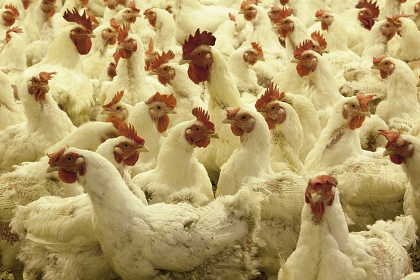Stop the Tyson Foods Anti-Farmer Act!

The factory farm industry is so full of bad actors it’s tough
to say who’s the worst. But Tyson Foods (NYSE: TSN) surely
belongs at or near the top of the list.
Besides Tyson’s
well-documented animal abuse record, its callous disregard
for the safety of its
employees, and its role as one of this country’s
worst polluters, Tyson is also actively lobbying to prevent
Congress from passing legislation that would provide basic
protections for the farmers who raise the animals, under
contract, destined for Tyson’s processing plants.
Take Action: Tell Congress to stop the Tyson Foods
Anti-Farmer Act!
When Congress returns to work after Labor Day, lawmakers will be
rushing to meet the September 30 deadline for yearly spending
bills, including the agriculture appropriations bill. As big
corporations look to cash in on their campaign contributions,
Tyson lobbyists are in full swing in support of a provision to
further weaken protections for farmers who raise livestock,
including poultry, for companies like Tyson.
The provision Tyson is so keen to pass is known as the "GIPSA rider. It is intended to block the U.S. Department of Agriculture (USDA)’s Grain Inspection, Packers and Stockyards Administration (GIPSA) from enacting new farmer protection rules that were first proposed in 2011, but have since been continually blocked by industry. The new rules were created under the Packers and Stockyards Act.
Now, as Congress works to pass a final joint ag appropriations bill, Tyson and other industry lobbyists are once again trying to ram through the GIPSA rider.
We call this provision the “Tyson Foods Anti-Farmer Act” for
two reasons.
One, because that’s exactly what the GIPSA rider is—legislation
that “would severely limit the USDA’s ability to protect
farmers’ basic rights — like the right to free speech or freedom
of association—in their dealings with large meatpacking and
poultry companies,”
says the National Sustainable Agriculture Coalition.
And two, because Springdale, Ark.-based Tyson Foods, the world’s
largest processor and marketer of chicken, beef, and pork, is
clearly
behind the rider. Why? So Tyson Foods Chairman John Tyson
can protect his billions in profits, made by
cheating the farmers who literally feather Tyson’s nest.
How does Tyson cheat farmers?
John Tyson’s executive compensation includes
$859,100 worth of flights on the company’s private jets each
year. Tyson made his piles of money by making sure farmers get
an increasingly
smaller share of each consumer dollar spent on Tyson
products.
As a result, farmers’ incomes have dropped, even as Tyson has
watched his profit margins rise.
A full quarter of chicken farmers experience losses every year. Tyson doesn’t even pay them enough to meet their operating costs. Of growers whose sole source of income is chicken farming, 71 percent of are living below the poverty line.
How does Tyson get away with this? Through vertical integration
and consolidation, Tyson has removed competition. He can run his
monopolistic enterprise like a dictator. Tyson owns and controls
everything in his supply chain, from the animals to the feed to
the slaughterhouse.
Not only can Tyson decide how much to pay farmers, he can force
them to farm the way he wants. Or suffer the consequences.
To learn how this has hurt family farmers, watch “Under
Contract,” a series of short videos that
tell stories of contract farmers like Karen and Mitchell
Crutchfield who Tyson drove to bankruptcy and foreclosure.
John Oliver also does a brilliant job of
explaining how companies like Tyson cheat chicken farmers.
How would the GIPSA rider hurt farmers and help Tyson?
In 2011, the USDA finalized new GIPSA
rules to address the problems Tyson and the other big meat
companies have caused for family farmers like the
Crutchfields.
But those new rule were never enacted—because John Tyson has
used his friends in Congress to block them. And no wonder. Under
the GIPSA rules, Tyson would have to:
• Give poultry farmers adequate notice of
plans to suspend delivery of chicks;
• Meet stricter criteria to require farmers to
make additional capital investments in their poultry or hog
farm;
• Provide a reasonable period of time for a
farmer to remedy a breach of contract that could lead to
termination of their contract; and
• Let farmers take disputes to court if the
arbitration process outlined in the contract doesn’t adequately
protect farmers’ rights.
It's time to enact GIPSA’s rules to protect farmers.